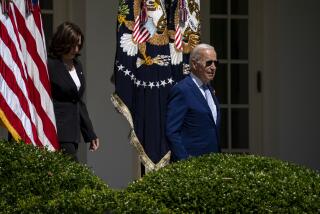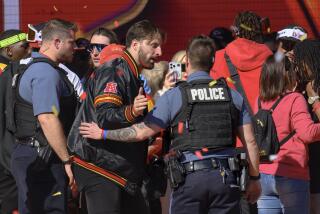Chicago Mayor Rahm Emanuel proposes strict limits on gun sales
- Share via
Chicago Mayor Rahm Emanuel has proposed a slate of tough gun control measures that would subject gun shops to strict monitoring, including video surveillance of all purchases, in an effort to stem violence in a city beset with an unusually high number of gun deaths.
The restrictions came after a federal court order in January forced Chicago to end its ban on gun sales in the city and gave officials until July to put in place regulations before the ban is lifted.
The Emanuel administration in a report released this week makes a case for Chicago gun shops to videotape all sales, ban gun shops in 99.5% of the city and limit each gun buyer at a store to one purchase a month, except for relics and returns. Gun sellers would be subject to quarterly audits.
In addition, gun shop workers would have to pass background checks and be trained to spot fake or “straw” purchasers, such as a male gang member getting a girlfriend to buy his gun because he’s ineligible.
Attempting to deter shops from making sketchy sales, city officials could cross-check records against a regional trace database that Emanuel wants to establish, showing where guns used in crimes were purchased. Fines for violations could run a few thousand dollars.
In New York City, former Mayor Michael R. Bloomberg sued more than two dozen gun shops for allowing straw purchases and breaking other laws in gun sales. In settlements reached about seven years ago, New York imposed many of the conditions that Emanuel is proposing.
A study released last year by Johns Hopkins University researchers found that the supply of guns used in crimes from the stores New York monitored, and sometimes fined, did decrease, though how much of the decrease could be attributed to the oversight could not be established.
Still, the researchers said that the result was “consistent with a growing body of research evidence which indicates that gun dealers’ sales practices affect the probability of guns getting to criminals and that policies designed to hold gun sellers accountable can curtail the diversion of guns to criminals.”
During the last five years, 20% of guns used in crimes in Chicago were bought from four shops just outside the city, according to this week’s report.
For example, Chuck’s Gun Shop in Riverdale, Ill., sold about 8% of guns, or 1,516, that were used in crimes in Chicago. Police recovered more than a third of those within three years, and city officials suggested that the original buyer purposely transferred most of those firearms to someone who used it in a crime.
Officials at all four stores declined to comment.
Two buyers — one in Georgia and one in Indiana — bought 33 of the thousands of guns used in Chicago crimes during that period.
Though Chicago’s rules might not choke off such suppliers, the mayor said he intended to make sure his city didn’t become a source of illicit guns.
“Now that we’re required to allow gun sales within the city limits, we do it in a way that does not undermine our public safety goals,” said Emanuel, speaking at the Police Department’s annual awards ceremony on Wednesday. He called the proposal “smart,” “enforceable” and one of the toughest in the country. But gun rights groups, who have challenged Chicago gun laws for years, could go to court to stop the latest effort if it passes the City Council.
A city report showed that 13 people out of every 100,000 in Chicago died because of guns in 2011, while 6 per 100,000 died in Los Angeles and 4 per 100,000 in New York as a result of firearms.
Congress has blocked federal legislation to require background checks before all gun purchases, including those at gun shows. Sixteen states require background checks in all cases, the city said. Chicago’s ordinance would bar gun sales at guns shows.
Also this week, a lawmaker in Massachusetts introduced legislation to strengthen what is already one of the country’s strongest limits on gun buying.
The measure would require all sales to take place in the presence of a licensed dealer. Police would also have the authority to reject rifle and shotgun sales to “unsuitable” buyers instead of just handgun sales. Massachusetts House Speaker Robert DeLeo said that in determining suitability, police would be ensured access to all public court records about prospective buyers’ criminal, mental health and substance abuse records.
Assessing legislation passed since the Sandy Hook Elementary School shooting in December 2012, the Law Center to Prevent Gun Violence reported at the beginning of May that eight states had strengthened their gun control laws and four had weakened them.
More to Read
Sign up for Essential California
The most important California stories and recommendations in your inbox every morning.
You may occasionally receive promotional content from the Los Angeles Times.













